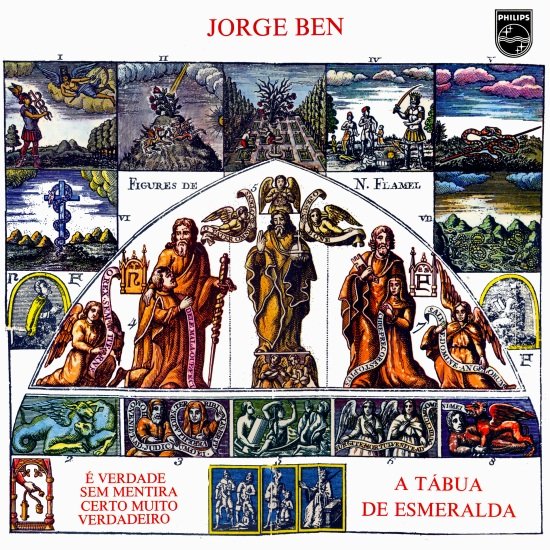I find it really awesome that Jorg Ben Jor successfully sued Rod Stewart for stealing the melody of his song “Taj Mahal” for the “Do Ya Think I’m Sexy” chorus. (He also allegedly changed his surname from Ben to “Ben Jor” after American smooth R&B king George Benson started receiving the Brazilian singer’s royalty checks.) Ben Jor is one of Brazil’s most prolific musical legends, having released over 30 albums in the last 50 years, many of which are out of print. Aside from being a musician with an immensely talented sense for melodies and soul-infused grooves, Jorge Ben Jor fascinates me because he doesn’t fit the mold of the Tropicália musicians that have been recently exported so seamlessly into the arms of American independent culture.
Ben Jor predated the psychedelic modus operandi of Tropicália by a few years, gaining more exposure because he was actually allowed to play concerts. His less overtly political lyrics didn’t warrant as much censorship from the dictatorship at the time. In the 1970, when Brazil’s musical palate expanded, he distanced himself from bands within the youth-based Joven Guarda genre because they often dismissed the Brazilian aspect of their music (samba/bossa nova roots) in favor of borrowing too much from Western rock ‘n’ roll. He became a figurehead in MPB (musica popularra de Brasil), but by the mid 70s, he headed further and further from traditional samba into the territory of African soul/funk samba fusion.
The 1974 masterpiece A Tábua de Esméralda (translated as “The Emerald Tablet”) showcases Jorge Ben Jor’s lifelong love for theosophy, mysticism, and, above all, alchemy. He frequently lists Aquinas (one of Christianity’s most famed alchemists) as an influence. The cover of the LP borrows drawings from Nicholas Flamel, a manuscript seller who was historically immortalized as a great alchemist for his work on the philosopher’s stone. “O Homem da Gravata Florida” is indebted to Swedish renaissance botanist/occultist/alchemist Paracelsus. The hit single from the album was “Os Alquimistas Estão Chegando” (The Alchemists are Coming) and was even featured in a 1980 Brazilian movie during a memorable drug-induced scene.
Part of what I find really charming about Jorge Ben Jor is that he seems comfortable existing inside and outside genre, expectation, and philosophy. While he writes songs influenced by dense mystical texts, he’s perfectly okay writing songs about soccer teams. From A Tábua de Esméralda, he doesn’t shy away from political messages during standout track “Zumbi,” honoring Zumbi dos Palmares, leader of a runaway slave colony in 17th-century Brazil. Another album track “Errare Humanum Est” talks of space, gods, and astronauts. He has an understated style with a commitment to his complex identity. And the production is lively and the music is beautiful too. Fusing personality with an amalgam of musical styles, A Tábua de Esméralda is a great entry point into Jorge Ben Jor’s alchemy and artistry.
